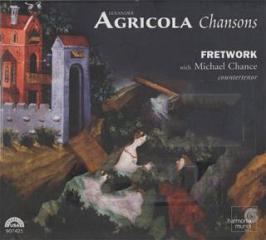Alexander Agricola - Chansons - Agricologies (2006)
Alexander Agricola - Chansons - Agricologies (2006)

01. I 2:31 02. II 2:33 03. III 1:49 Agricologies, for viols 04. Agricola I - Comme femme 5:30 05. Se je fais bien 5:48 06. Pater meus agricola est 6:37 07. Tout a part moy I 2:58 08. Si bibero 2:33 09. Si dormiero 4:05 10. Je nay dueil 10:19 De tous biens plaine 11. V 1:35 12. III 2:28 13. II 1:39 14. I 1:27 Agricologies, for viols 15. Agricola III - Obrecht canon I 1:06 16. De tous biens plaine IV 1:36 17. Vostre hault bruit 8:09 Dung aultre amer 18. II 1:36 19. III 1:46 20. I 1:49 21. En actendant 3:59 22. Fortuna desperata 3:05 Michael Chance, countertenor Fretwork Viol Consort
In his own time, which was that of the High Renaissance style (he died in 1506), Alexander Agricola was renowned across Europe. The popularity of his song Si dedero is attested to by the composition of parodies, two of which are included on this introduction to the composer's secular music. The Agricola song itself, inexplicably, is not included, but in other ways this disc has much to offer the newcomer to Renaissance music as well as the serious enthusiast at which it is principally aimed. What is offered to the newcomer? Take a look at the tracklist and note the repeated titles there. Chansons or French-language songs of this era, like sacred pieces, were often structured as elaborations of a tune, by the work's composer or by someone else, that would be played or sung in a lower register while counterpoint was written around it. The English early music ensemble Fretwork presents multiple Agricola settings of individual songs in sets, so the listener can compare the different kinds of counterpoint he might apply to a given tune. (The music is thought to have been played instrumentally; here a small viol consort is used.) The Renaissance listener paid attention to questions like: how many voices or parts are there? how is the cantus firmus or preexisting melody treated? what are the intervals or kinds of motion used in the added voices? are there hidden plans or other kinds of artifice superimposed on the song's structure? With the help of this disc, the modern listener can get a feel for the original context. A good place to start are the five settings of De tous biens plaine, a chanson by Hayne van Ghizeghem (tracks 10-14 and 16): all are short, and most of them present the tune fairly straightforwardly, but they inhabit different worlds in terms of intervals and texture. In a word, they feel different from one another. Several longer chansons (with text, beautifully sung by countertenor Michael Chance) bring us closer to the smooth, deliberate melody of Josquin and set off what annotator Fabrice Fitch describes as a quirky quality in much of Agricola's music.
So the disc is highly listenable on various levels. On some of those levels, the interpolation of parts of a modern composition by Fitch, called Agricologies, will be distracting. Fitch's music might be described as neo-Renaissance; it begins with the basic materials of Agricola's music but extends its rhythmic and harmonic language. Fitch sets two of the tunes represented in Agricola's "sets" (one is De tous biens plaine; the other is Busnois' Comme femme desconfortee), and the listener ensnared by Agricola's webs of counterpoint may be intrigued to hear modern extensions of them. But others, even those receptive to the idea of modern experimentation with the Renaissance musical language, may feel that Fitch's works would have worked better if segregated rather than wedged into the sequence of Agricola pieces. ---James Manheim, Rovi
download: uploaded anonfiles mega 4shared mixturecloud yandex








